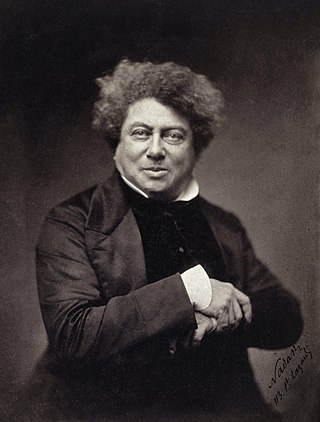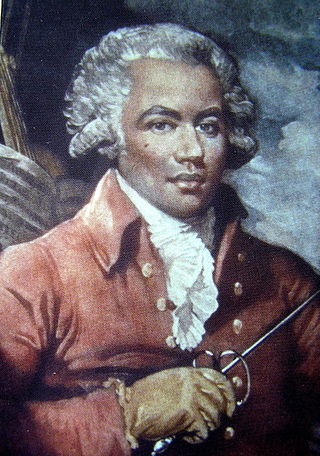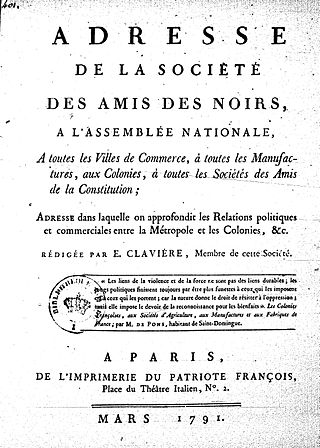
Claude Ribbe (born 13 October 1954) is a French writer, activist and filmmaker.

Claude Ribbe (born 13 October 1954) is a French writer, activist and filmmaker.
Ribbe was born in Paris and is alumnus of the Ecole normale superieure.
Ribbe has specialised in the history of colonialism in the Caribbean. He has also been active in promoting civil rights in France for people of ethnic African and Caribbean origin.
Through his books and films, he has supported the recognition of figures such as Eugene Bullard, Chevalier de Saint-George, and Thomas-Alexandre Dumas, who was the first black man to be promoted to general in the French Army in 1793.
In his book Le Crime de Napoleon (2005), Ribbe accused Napoleon of having used sulphur dioxide gas for the mass execution of more than 100,000 rebellious black slaves when trying to put down slave rebellions in Saint-Domingue (now Haiti) and Guadeloupe. He said this was a model for Hitler's holocaust nearly 140 years later.

Alexandre Dumas fils was a French author and playwright, best known for the romantic novel La Dame aux Camélias, published in 1848, which was adapted into Giuseppe Verdi's 1853 opera La traviata, as well as numerous stage and film productions, usually titled Camille in English-language versions.

Alexandre Dumas, also known as Alexandre Dumas père, was a French novelist and playwright. His works have been translated into many languages and he is one of the most widely read French authors. Many of his historical novels of adventure were originally published as serials, including The Count of Monte Cristo, The Three Musketeers, Twenty Years After and The Vicomte of Bragelonne: Ten Years Later. His novels have been adapted since the early twentieth century into nearly 200 films.

Charles de Batz de Castelmore, also known as d'Artagnan and later Count d'Artagnan, was a French Musketeer who served Louis XIV as captain of the Musketeers of the Guard. He died at the siege of Maastricht in the Franco-Dutch War. A fictionalised account of his life by Gatien de Courtilz de Sandras formed the basis for the d'Artagnan Romances of Alexandre Dumas, père, most famously including The Three Musketeers (1844). The heavily fictionalised version of d'Artagnan featured in Dumas' works and their subsequent screen adaptations is now far more widely known than the real historical figure.
Négritude is a framework of critique and literary theory, developed mainly by francophone intellectuals, writers, and politicians of the African diaspora during the 1930s, aimed at raising and cultivating "Black consciousness" across Africa and its diaspora. Négritude gathers writers such as sisters Paulette and Jeanne Nardal, Martinican poet Aimé Césaire, Abdoulaye Sadji, Léopold Sédar Senghor, and Léon Damas of French Guiana. Négritude intellectuals disavowed colonialism, racism and Eurocentrism. They promoted African culture within a framework of persistent Franco-African ties. The intellectuals employed Marxist political philosophy, in the Black radical tradition. The writers drew heavily on a surrealist literary style, and some say they were also influenced somewhat by the Surrealist stylistics, and in their work often explored the experience of diasporic being, asserting ones' self and identity, and ideas of home, home-going and belonging.

Victor Schœlcher was a French abolitionist, writer, politician and journalist, best known for his leading role in the abolition of slavery in France in 1848, during the Second Republic.

Eugene Jacques Bullard was one of the first black American military pilots, although Bullard flew for France, not the United States. Bullard was one of the few black combat pilots during World War I, along with William Robinson Clarke, a Jamaican who flew for the Royal Flying Corps, Domenico Mondelli from Italy, and Ahmet Ali Çelikten of the Ottoman Empire. Also a boxer and a jazz musician, he was called "L'Hirondelle noire" in French.

Paul Henri Corentin Féval, père was a French novelist and dramatist.

Édouard Glissant was a French writer, poet, philosopher, and literary critic from Martinique. He is widely recognised as one of the most influential figures in Caribbean thought and cultural commentary and Francophone literature.

Joseph Bologne, Chevalier de Saint-Georges, was a French Creole virtuoso violinist and composer, who was conductor of the leading symphony orchestra in Paris.

The Society of the Friends of the Blacks was a French abolitionist society founded during the late 18th century. The society's aim was to abolish both the institution of slavery in the France's overseas colonies and French involvement in the Atlantic slave trade. The society was founded in Paris in 1788, and remained active until 1793, during the midst of the French Revolution. It was led by Jacques Pierre Brissot, who frequently received advice from British abolitionist Thomas Clarkson, who led the abolitionist movement in Great Britain. At the beginning of 1789, the Society had 141 members.
Napoleon's Crimes: A Blueprint for Hitler is a book published in 2005 by French writer Claude Ribbe, who is of Caribbean origin. In the book, Ribbe advances the thesis that Napoleon Bonaparte during the Haitian Revolution first used gas chambers as a method of mass execution, 140 years before Hitler and the Nazis. His accusations in the book has caused a minor political and academic storm when it was published, and its premise remains under contention to this day.

Thomas-Alexandre Dumas Davy de la Pailleterie was a Creole general, from the French colony of Saint-Domingue, in Revolutionary France. Along with his French contemporary Joseph Serrant, Toussaint Louverture in Saint-Domingue and Abram Petrovich Gannibal in Imperial Russia, Thomas-Alexandre Dumas is notable as a man of African descent leading European troops as a general officer. He was the first person of color in the French military to become brigadier general, divisional general, and general-in-chief of a French army.
Mathilda Marie Berthilde Paruta, better known as Darling Légitimus, was a French actress. In 1983, she received the Volpi Cup for Best Actress for her performance in the film Sugar Cane Alley.

Juliette Benzoni was a French author and international bestseller in several genres, including historical romance, historical fiction, mystery and screenwriting. In 1998, at the age of 78, she received the Chevalier de l'Ordre National from President Jacques Chirac.

Jacques Weber is a French actor, director, and writer.

The Code noir was a decree passed by King Louis XIV of France in 1685 defining the conditions of slavery in the French colonial empire. The decree restricted the activities of free people of color, mandated the conversion of all enslaved people throughout the empire to Catholicism, defined the punishments meted out to slaves, and ordered the expulsion of all Jews from France's colonies.
Haitians in France consist of migrants from Haiti and their descendants living in France.
Marie-Cessette Dumas (1714–1786) was an enslaved woman in the French colony of Saint Domingue. She was the mother of General Thomas-Alexandre Dumas, the grandmother of novelist Alexandre Dumas, and the great-grandmother of playwright Alexandre Dumas, fils, and has been called a "great matriarch to a saga of distinguished men". She was an enslaved woman of African descent enslaved by the Marquis Alexandre Antoine Davy de La Pailleterie. They lived at a plantation called La Guinaudée near Jérémie of the French colony of Saint-Domingue, until Antoine's departure in 1775.
The Conspirators is a novel written by Alexandre Dumas and Auguste Maquet, published in 1843. Dumas reworked a preliminary version by Maquet; this was the beginning of their collaboration which was to produce eighteen novels and many plays. The dramatisation of the novel – in five acts, a prologue and ten tableaux – was first performed on 16 July 1849 at the Théâtre-Historique in Paris. It was adapted into an opera, Le chevalier d'Harmental, by André Messager with a libretto by Paul Ferrier, which was first performed on 5 May 1896.

Charles Jean-Baptiste Jacquot, who wrote under the pen name Eugène de Mirecourt, was a French writer and journalist. The main critic of Alexandre Dumas, he contributed novels, short stories and biographies to the French literary life of the second half of the 19th century.